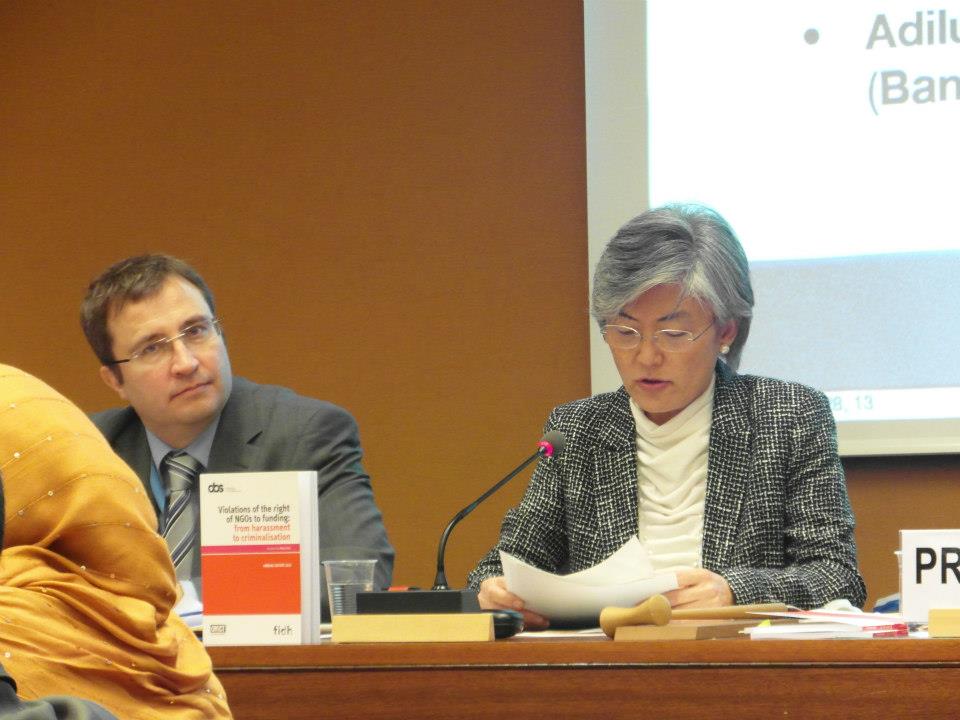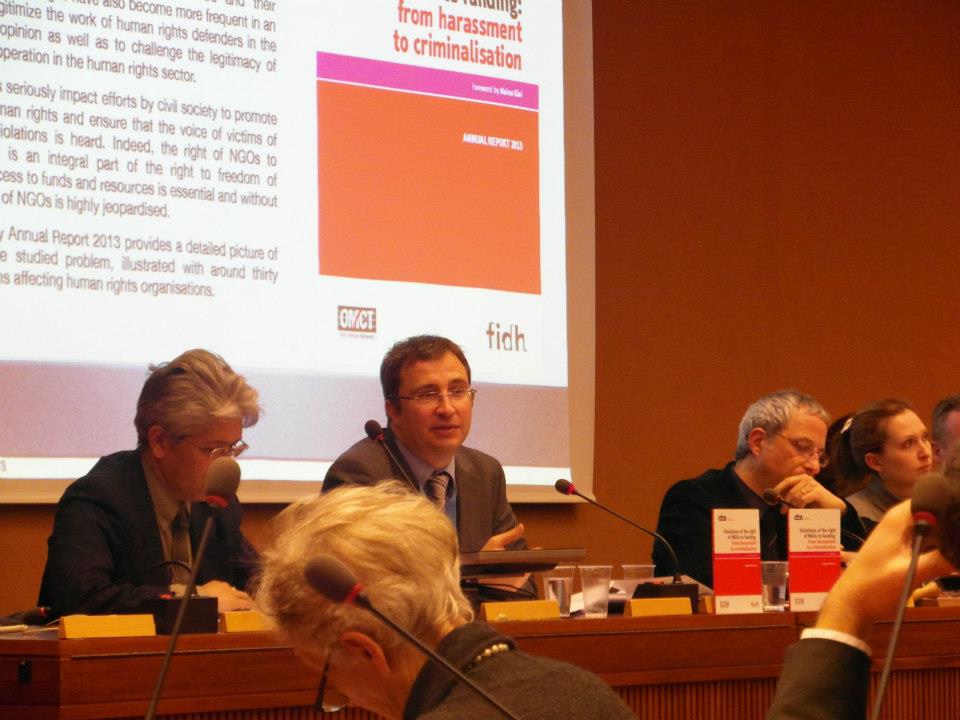The UN Human Rights Council should urgently address the issue of increasing obstacles to NGOs access to funding!
IMPACT!
In a very positive move, on March 21, 2013, the United Nations (UN) Human Rights Council adopted by consensus - despite last minute hostile amendments proposed by China, Cuba, Egypt and the Russian Federation - an unprecedented resolution, introduced by Norway and co-sponsored by 70 States, affirming that “no law should criminalise or de-legitimise activities in defence of human rights on account of the origin of funding”. By doing so, the Council gave a strong response to the increasing trend of curtailing - when not criminalizing - the activities of human rights defenders by limiting their right to access funding, especially when they come from foreign countries (for more information see below).
AsMs. Navi Pillay, UN High Commissioner for Human Rights, highlightedin her openingstatement to the 22ndregular session of the United Nations Human RightsCouncil, it remains “a matter of great concern that so many Stateauthorities continue to ignore or repress civil society organizations, humanrights defenders and the media”, those “heroes of our time”.
All over the world, humanrights defenders indeed continue to face dailyrepression, being subjected to acts of harassment and intimidation, physicalattacks, arbitrary detention, judicial harassment, ill treatments or even death.
In the AnnualReport 2013, the first authoritative study on restrictions on human rightsdefenders’ access to funding which was released in parallel to the session ofthe Human Rights Council on 28th February, theObservatory for the Protection of Human Rights Defenders demonstrates how NGOs’access to funding, in particular foreign funding, is increasingly being hinderedby governments around the world. States resort to restrictive laws, smear campaigns and judicialharassment against human rights defenders as a way to stifle anycriticism, such as in the Russian Federation, Ethiopia,Belarus, Egypt, India or Bangladesh, among others.
“The UN Human Rights Council -notably through the resolution that is being presented by Norway on the issue -should call for stronger protection for those actors for change and theguarantors of a free society”, said Mr.Gerald Staberock, OMCT Secretary General. "As restrictions toaccess to funding clearly aim at silencing human rights defenders and by thesame token the voice of victims of human rights violations, it is of vital importance that theCouncil addresses this as a matter of priority", he added.
This call was echoed by Ms. Kyung-whaKang, Deputy High Commissioner for Human Rights, in the openingremarks she delivered at the high levelpanel discussion that wasorganised in the UN on the occasion of thelaunch of the Annual Report 2013 of the Observatory: "This resolution is anopportunity for the Council to go one step further and take a strong stand onthis important issue".

During this sideevent, human rights defenders from the Russian Federation, Bangladesh and Egypt contributedto a better understanding of the concrete impact of such restrictions to accessto funding and their effect on human rights defenders in all regions of theworld.

Mr. MainaKiai,UN Special Rapporteur on the Rights to Freedom of Peaceful Assembly and ofAssociation, and Ms. Margaret Sekaggya, UN SpecialRapporteur on the Situation of Human Rights Defenders, also addressed the panelthrough video recordings:
Maina Kiai's oral intervention / Launch of OBS report 2013 / UN Side-Event 28th Feb 2013 from OMCT / SOS-Torture Network on Vimeo.
Margaret Sekaggya's oral intervention / Launch of OBS report 2013 / UN Side-Event 28th Feb 2013 from OMCT / SOS-Torture Network on Vimeo.
IMPACT!
In a very positive move, on March 21, 2013, the United Nations (UN) Human Rights Council adopted by consensus - despite last minute hostile amendments proposed by China, Cuba, Egypt and the Russian Federation - an unprecedented resolution, introduced by Norway and co-sponsored by 70 States, affirming that “no law should criminalise or de-legitimise activities in defence of human rights on account of the origin of funding”. By doing so, the Council gave a strong response to the increasing trend of curtailing - when not criminalizing - the activities of human rights defenders by limiting their right to access funding, especially when they come from foreign countries.
“Wewelcome the adoption of this important resolution, through which the UN HumanRights Council is calling for stronger protection for those actors for changeand the guarantors of a free society”, said Gerald Staberock, OMCT Secretary General.“States have the responsibility to abideby the resolution and ensure that human rights NGOs are enabled to accessfunding, as such restrictions clearly aim at silencing them”, he added.
Thisresolution confirms and reinforces the previous conclusions of UN human rightsmechanisms affirming the non-compliance of restrictive and repressive practicesand laws with international human rights law.
Allrelevant UN mechanisms should now build on this text to enhance the protectionof human rights defenders targeted by legislations and practices curtailingtheir legitimate activities in many countries.
The 70 cross-regional co-sponsors of the resolution are the following: Albania, Andorra, Angola, Argentina, Armenia, Australia, Austria, Belgium, Bosnia and Herzegovina, Benin, Bulgaria, Brazil, Canada, Chile, Costa Rica, Côte d’Ivoire, Croatia, Cyprus, Czech Republic, Denmark, Djibouti, Egypt, Estonia, Finland, France, Georgia, Germany, Greece, Guatemala, Honduras, Hungary, Iceland, Indonesia, Ireland, Italy, Japan, Latvia, Libya, Liechtenstein, Lithuania, Luxembourg, Maldives, Malta, Mexico, Morocco, The Netherlands, Republic of Moldova, Montenegro, Nicaragua, Nigeria, Norway, Paraguay, Peru, Poland, Portugal, Romania, Sierra Leone, Slovakia, Slovenia, Spain, State of Palestine, Sweden, Switzerland, the former Yugoslav Republic of Macedonia, Timor-Leste, Tunisia, Turkey, United Kingdom of Great Britain and Northern Ireland, United States of America, Uruguay.
Formore information, see also http://www.omct.org/human-rights-defenders/urgent-interventions/2013/03/d22194/